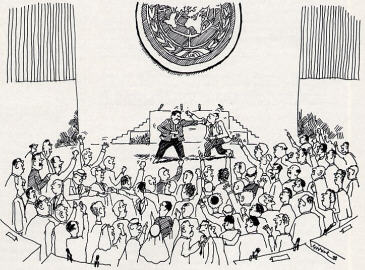"Think of it," began President Ronald Reagan in a low, deliberate voice. "You are sitting at that desk. The word comes that they [the missiles] are on their way. And you sit here knowing that there is no way of stopping them. So they're going to blow up how much of this country we can only guess at, and your only response can be to push the button before they get here so that even though you're all going to die, they're going to die too." (Time magazine)
In 1965 President Dwight D. Eisenhower proclaimed, "The era of armaments has ended. The human race must conform its action to this truth or die." Yet the Atomic Age has witnessed no abatement in the friction between nations that generates a need for weapons and war.

The Srimad-Bhagavatam attributes these undying tensions to a lack of God consciousness, and calls for a broad awakening based on scientific spiritual principles to remedy the crisis. These principles derive from the understanding that God is the supreme enjoyer, that He owns everything, and that He is everyone's friend. The Bhagavatam promotes the practical techniques of sense control, service to saintly persons, and meditation on the Supreme Truth.
Some persons may insist that to consider spiritual remedies for a material crisis of the magnitude of imminent nuclear war is impractical and simplistic. But as Roger Rosenblatt wrote in a Time essay, "Most proposed solutions to this problem sound naive, the sophisticated answers being either to take up arms or give up entirely."
A history from the Srimad-Bhagavatam dramatically illustrates how neglect of spiritual activities produces the psychological conditions that lead to enmity and war. The Bhagavatam tells of the powerful king Hiranyakasipu, who was deeply attached to his great political might and economic prosperity and was accustomed to those around him bending to his will. His lust and greed were sharply contrasted by the qualities of his saintly son Prahlada, whose purity and detachment from worldliness enraged the irascible king. When Prahlada repeatedly refused to adopt his father's materialistic ways, the king threatened him, mocking his conviction that God, being omnipresent, would protect him. In a fury, Hiranyakasipu smashed a palace column, shouting for Prahlada's God to show Himself. Krsna emerged from the column in the ferocious half-man, half-lion form of Nrsimhadeva and slayed Hiranyakasipu, abruptly ending his illusion of greatness.
Srila Prabhupada explains in his commentary on this narration: "Since the creation of the material world, there have been two kinds of men the devas and the asuras. The devas are always faithful to the Supreme Personality of Godhead, whereas the asuras are always atheists who defy the supremacy of the Lord. At the present moment, throughout the entire world, the atheists are extremely numerous. They are trying to prove that there is no God and that everything takes place due to combinations and permutations of material elements. Thus the material world is becoming more and more godless, and consequently everything is in a disturbed condition."
The defiant spirit of the modern atheist is conspicuous in the most powerful nations of today. The godless attitude of many scientists was revealed by British scientist Peter Adkins on a recent BBC broadcast. "I believe science can explain everything in the universe," he said, "even beauty and the emergence of religious belief. I also believe that we'll be able to solve the biggest question of all, the question of where we all came from." Such a godless mentality creates a climate of materialism, founded on false proprietorship and powerful drives for sense gratification. As in the case of King Hiranyakasipu, the atheistic conception of ourselves as the owners and enjoyers of what is factually the property of God is the underlying error in such thinking.
This error leads to international conflicts in many ways. For example, when we believe that we are the owners and enjoyers of the earth's resources, we feel no compunction in slaughtering innocent creatures to proved meat for our meals. According to the Vedic teachings, this indiscriminate killing reacts heavily on human society: wars are a direct karmic reaction to animal slaughter. Animal slaughter also leads to war indirectly, because it nurtures qualities like pride and aggressiveness, which act as the root causes of war. But If we were to adopt spiritual processes for controlling our senses, we would be satisfied to maintain our bodies with foods that do not require violence to obtain. Thus we would eliminate a major cause of the belligerent tendencies that plague efforts for world peace.
Until we can subdue our mentality of exploiting material nature and other living entities, all our political plans for constructing a foundation for peace will fail. Even the United Nations, founded to maintain peace and security, stands accused of disrupting world harmony.
Retired U.S. Ambassador to the United Nations Jeane Kirkpatrick described the organization's ineffectiveness in these words: "What goes on in the U.N. actually exacerbates conflict…. All kinds of countries that don't have any direct interest in a conflict get involved in it. As a result, you might say all conflict is globalized."
And John Burton, director of the Center for the Analysis of Conflict, at the University of Kent, England, writes in Peace Theory: Preconditions to Disarmament, "The United Nations, operating in the absence of constructive regional bodies and in a world environment dominated by military alliances, itself contributed to the aggravation of conflicts and to their spread. Its operation threatened even its own existence by 1960."
Such contradictions should not surprise us; rather we should expect them. A world where every nation is a potential source of anxiety for others is a stage set for war. The "crystal ball effect" knowledge of the incredible destructive capacity of nuclear weapons is not a sound basis for peace. To create a lasting peace, today's leaders must assimilate the message of the Vedic literature that Lord Krsna is the supreme owner, the supreme enjoyer, and the friend of all living entities.
